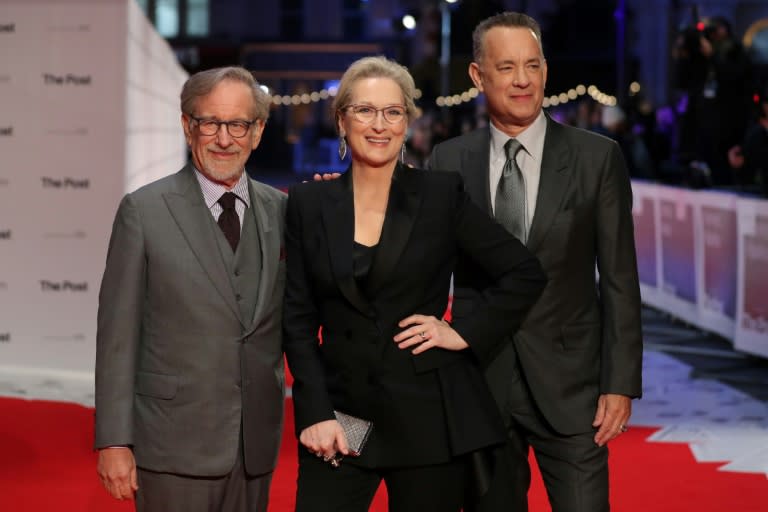Lebanese authorities have banned Steven Spielberg’s latest film, the political thriller “The Post,” and the Australian drama “Jungle” in compliance with a boycott of Israel, an official told AFP on Monday. “The screening of the film ‘The Post’ has been banned,” said the official from Lebanon’s General Security Authority, who spoke on condition of anonymity. Spielberg “is on the blacklist of the Arab League boycott office, which Lebanon aligns with,” the official said. The pan-Arab organization maintains a regional boycott of Israel and blacklisted Spielberg after he donated $1 million to Israel during the 2006 war with Lebanon. The two countries are technically still at war. Although Lebanon is generally considered the most liberal Arab country, it occasionally bans content deemed immoral, inflammatory or supportive of Israel. The General Security is responsible – in addition to controlling Lebanon’s borders – for censoring films, plays and books. “The Post” was due to hit Lebanese cinemas on January 18. The acclaimed production tells the behind-the-scenes story of the Washington Post’s 1971 publication of the Pentagon Papers, which exposed the lies behind US involvement in the Vietnam War. The film, starring Hollywood heavyweights Tom Hanks and Meryl Streep, was praised for using star power to highlight the benefits of a free press. – Survival drama ‘retracted’ – The censorship axe also hit “Jungle,” a survival drama about Israeli adventurer Yossi Ghinsberg, who got lost in an unexplored part of the Bolivian Amazon in 1981. The production, starring Daniel Radcliffe, had been running in Lebanon for two weeks but is now being withdrawn, the same official told AFP. “The film had received a screening permit and was actually shown, but several complaints received led us to withdraw it from cinemas to avoid problems,” the official said, without specifying the nature of the protests. A few days ago, the Lebanese branch of the Campaign to Boycott Supporters of Israel (CBSI) called for a boycott of “Jungle,” citing its links with Israel. “The film is about an Israeli backpacker and is based on the book by Israeli author Yossi Ghinsberg, who was born in the Zionist part of the country, grew up in Tel Aviv and served in the Israeli navy,” the campaign said. “One of the producers, Dana Lustig, is also Israeli,” she added. Another controversy brewed on Monday over the American film “Beirut,” about a CIA agent kidnapped in the Lebanese capital at the height of the 1982 civil war. The fictional film is due to hit US theaters on April 13, the anniversary of the outbreak of the Lebanon War, but has already sparked outrage in Beirut itself. Lebanese people have sharply criticized the film for not being shot in Lebanon and for not featuring local actors. “Hollywood is rewriting history and exploiting Lebanon’s past without Lebanese insight… We demand a complete ban on the film (on the grounds of) cultural defamation,” said an online petition. Culture Minister Ghattas Khoury also spoke out, saying it was clear the film was intended to “harm Beirut and its residents.” – ‘Clear standards’ – Restrictions by Lebanese authorities and public pressure from groups such as CBSI have increased recently. Last year, Lebanon banned the Hollywood blockbuster “Wonder Woman” because lead actress Gal Gadot had served in the Israeli military. French-Lebanese director Ziad Doueiri was questioned by Lebanese authorities in September over his film “The Attack,” which was partly shot in Israel. Banned in Lebanon in 2012, the film tells the story of an Israeli surgeon of Arab origin whose wife carries out a suicide attack. And just last week, celebrated Lebanese fashion designer Elie Saab was the subject of public criticism for a picture he posted on Instagram showing Gal Gadot wearing one of his dresses. The photo was deleted after a flood of critical comments. Lebanese are divided over the boycott-related bans; some welcome them as a bulwark against the “cultural normalization” of the Israeli occupation. Writer and CBSI member Samah Idris said the recall of “Jungle” was “another victory for supporters of the boycott of Israel’s enemy in Lebanon and the Arab nation, and for supporters of Palestine in general.” Others insisted that a boycott should be an individual decision and not imposed by the authorities. Film critic Nadim Jarjura called on the government to establish “clear standards” when restricting films. “If the Lebanese authorities decide that a certain film can be shown because it complies with the laws and conditions of the boycott, I do not understand how other authorities can change that decision,” he told AFP. Banned films can often be found in pirated stores across the country for around a dollar, and even blacklisted books can sometimes be found in regular bookstores.
Lebanon bans Spielberg film and Israeli adventurer biopic

